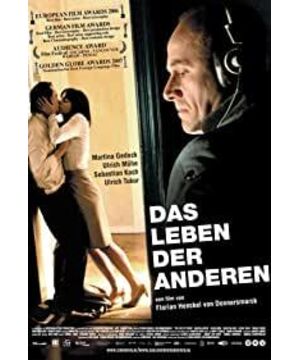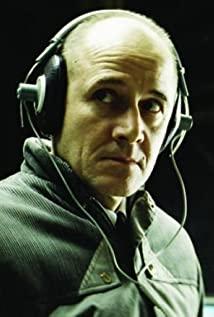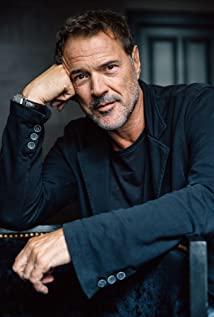has one thing in common: the best film "Infernal Affairs" and the best foreign language award "Eavesdropping Storm" (also translated as "Other People's Lives") at this year's Academy Awards: they are both about "special agents". "of. The former is based on the Hong Kong movie "Infernal Affairs", and the content is the familiar black and white undercover story; the latter is a 33-year-old German young man Florian. Henkel. Feng. Dona Schmark's terrific debut novel about how East German authorities spied on and controlled artists through wiretapping.
To a large extent, the highest honor this time is not so much awarded to the film "Infernal Affairs" as it is to its director Martin. Scorsese's. The company shot to fame in 1973 with the autobiographical gangster film "Mean Streets", and in 1976, "Taxi Driver" became a milestone in film history and pushed American independent production to a new level. Since then, every one or two years, this old man will make some noise. He has been nominated for the best director Oscar four times ("Raging Bull" 1981, "The Last Temptation of Christ" 1989, "Goodfellas" 1991 , "Gangs of New York" 2003), and more than once nominated for best screenplay, but all missed. People called him this time the award is "popular", indeed, about Martin. Scorsese and the Oscars are like a long suspense drama, and it should end.
From the film itself, it's frustrating. It should not be said that films based on other people are definitely inferior in terms of originality, but this American version of "Infernal Affairs" really does not have much excitement. Its tense and warm atmosphere is largely due to The two big stars Leonardo and Matt. Damon's performance full of anxiety was completed. It should be said that the previous Liang Chaowei and Andy Lau were more calm than these two, and the characters they presented were also more complicated. By Martin. Scorsese's "thousands" of complicated shots (his "signatures" in recent years) convey a pared-down story that is too simple to be simple, in which black and white, good and evil, go their separate ways. Dao, the so-called "undercover" is just like working in a different department. Different environments have no other penetrating influence on the spiritual world of the client. They are not prepared to see the world from the eyes of the people around them even for a minute, and they do not admit that they are in the world. The other person also has any content of his own, and because of this, he feels some inner pressure. The film arranges for two undercover heroes to share a girlfriend, replacing the intertwined entanglement within the character's own spirit with a cross-relationship with women, which is really superficially naive. It can be said that when Martin. The closer Scorsese gets to the Oscars, the further he gets from his hard, unrelenting beginnings. This reminds me of Chen Kaige here. With Chen Kaige's profound vision of Chinese Confucian culture revealed in "The Yellow Earth" and "Kid King", he actually didn't need to shoot such (inexplicable) things as "Wuji", while Martin. Scorsese seemed to be equally obsessed when he made the award-winning film.
In contrast, "The Wiretap" offers a supplementary vision, with a completely different treatment in terms of the complexity of human nature and the possibility of human nature. The young Dona Schmark has been preparing for this film for nine years. When he took the script he wrote and looked for investment, people's first reaction was "this thing is too serious", and they speculated that the audience seemed to like "Goodbye" more. Nostalgic comedy like Lenin.
Not just Martin. The "black and white" undercover officers in Scorsese's films, people of all kinds in this world, live in a "prescribed situation" and play their roles according to old scripts. Unless the "plot" changes, the "character" remains the same, and people go on to say that the environment is destiny, everything is caused by the environment. In the words of another protagonist of the film, the playwright Dreyman, "What can we do in this environment?" Dreyman's "environment" was East Germany at the end of 1984. In the box of the drama theater starring his wife, sat the secret police of the state security department. In the audience sits the country's Minister of Culture. After the show, people from the cultural sector and the security sector sat in the vacant seats, sharing a lot of common language because they had a common cause.
The task of monitoring the playwright and actress couple was assigned to a police officer named Weissler, who had been teaching young students at the police school how to use sleep-deprived fatigue tactics to get what they wanted out of a "suspect." A student in his class asked, "Is this inhumane?" His response was to quickly place a distrust sign under the student's seat map. Of course he also knew the enormity of the task. On the one hand, this is because the playwright is "old and cunning", and it is not easy for people to get caught. On the other hand, it is because if he can't find something, it will directly affect his career. This is what his "head" said when assigning tasks. of. But the Mr. Weissler seemed smug. He also had another motive that he couldn't state clearly - when he was watching the play just now, he stared at the actress with his binoculars for a long, long time. He and his mates filled the playwright's house with wiretap wires, making sure they could be heard everywhere, including when they were having sex.
"Cynicism" cannot be used universally to describe the people who live in it, and the situation may be varied. For Dreman, the bottom line is that he writes with conscience, and in order to write he needs to live a quiet, undisturbed life. But when the Minister of Culture threatened him that there was a problem with his script and that his performance might be cancelled, he immediately said that "people follow their own conscience", that is, he can do whatever he wants. Two of his fellow writers, Moss and Eskar, seemed a little more drastic than him, and they used the language I wrote in my translation work: "What was unacceptable is now commonplace. ' and 'It can't go on like this anymore'.
If it weren't for the suicide of his friend Iskar, Dreman's life might have continued for a while. Escar's death deeply stimulated him, and he lost his ability to write, which made him restless day and night, feeling that his tolerance had reached the limit. His friend brought a miniature typewriter with which he wrote about the phenomenon of suicide in East Germany, in which the news of Iskar's death was published in the West. He finally breathed a sigh of relief, this thing is of course anonymous. Instead, the gigantic police machine was so nervous that someone was busy trying to find the author.
If Dreyman's unusual behavior has opened up a human space that lights up, and many people are inspired by his approach, then the eavesdropper Weissler's actions are only prepared for himself - in the absence of others In the dark place of knowledge, he also opened up a space of humanity for himself, and prepared a sublimated humanity for himself.
At first, unconsciously, he was attracted by the beauty and temperament of the hostess. He felt bad for the couple when he saw the actress he admired being brought back in the minister's car. His first act of intervening in life, intervening in the "script," was to make the doorbell chime in the listening room, get the husband to open the door, and let him see his wife getting out of the limousine. The second time was even more extreme. When the wife was still under duress to go to the hotel to meet the big man, he appeared from the shadows, and as an enthusiastic audience, he expressed his liking for her "reality" and reminded that "to sell yourself for art, It's not a good deal." When the lady turned back, her husband was delighted, and he filled himself with a sense of accomplishment.
And as he closely watches the couple's every move, he also has the opportunity to get up close and personal with people who are completely different from his own environment. When his friend Eska committed suicide, Dreman could not suppress the grief in his chest. When he played Beethoven's "Passion Sonata" on his own piano, Weissler was wearing eavesdropping headphones and felt tears in front of a lot of cold monitoring machines. Orbit -
a feeling he was unfamiliar with appeared. Indeed, Lenin at that time was also moved by this piece, and at the same time worried that this piece would affect the principles of the violent revolution he was engaged in, which made the revolutionary teacher "want to praise those who live in a filthy hell and still can create beauty, Wanted to kiss their heads", of course he didn't actually do it. The inquisitive eavesdropper also took a copy of Brecht's poems from the playwright's desk, lingering in front of the sentence: "Each day in early autumn and September is blue / We have our heads on our heads. A beautiful and clean sky/A cloud moves slowly/It's so white and flawless/And as long as you believe in your heart/It will always be by your side".
Whoever is excited by such verses is still saved. He then proposed to his superiors to monitor the family by himself, so that he could selectively record some insignificant things. The typewriter thing never appeared in his records. At the end of the film, after the virgin host confessed the "methods of committing crimes" hidden under the floor of his aisle, he took a step forward and moved this hot thing away before his peers arrived. He rewrote the "script" again and changed his "role". Compare Martin. The two "agents" in Scorsese's award-winning film, the eavesdropper is far more interesting and charismatic. He stepped out of his "prescribed situation" and created other scenes with his "character", which not only saved the playwright from a huge catastrophe, but also saved his own humanity.
Director and screenwriter Dona Schmark explained this: "You have choices." This is what I call "ethical imagination." It refers to people's determination to live an ethical life out of trust in themselves and feel that it is feasible. It exists both in life and in creation. People feel that they need a better life than the one they have now, that they can "get off the ground" and step into that kind of life instead of being perpetually haunted by a feeling of powerlessness. An ethical impulse is called "imagination" because it seems impossible, bizarre, or outrageous in the eyes of others. How could an agent in the "Flying Nest" end up being infected by the object of his surveillance? When Donaschmark contacted some of the East German office buildings for field shooting, the director of the prison museum rejected his request because, according to the museum director, throughout East Germany, secrets like Weissler's "conscience found" None of the police! And the reason why this young man insisted on writing the script and shooting like this is because it is logically possible. This is the logic of conscience, the logic of ethics.
Donaschmark's imagination comes from "life", from the lives of those who have the imagination to change their "scripts", they are Javier, Jan. Patochek, Ivan. Klima, Michnik, Kulon, Ripsky in Poland, Biermann (East Germany) in East Germany, Keith in Hungary, all of them are not born to be heroes, but like this "Eavesdropping". Like Dreman in The Storm, he just wanted to do what he likes without interruption. Later, like Dreman, he found that this was practically impossible, so he stepped into another space to fight for freedom. When they are the most difficult, they will ask back what is the point of doing this? And what ultimately supports them is a demand for their own ethics: things can no longer continue like this, and they should change from changing themselves.
Lack of this ethical imagination in the film is the playwright's wife, actress Chris. Maria. Before Agent Weisler advised her not to go on a date with the minister, her husband had advised her that she was such a popular actress that there was no need to do so, and she just wouldn't listen. She couldn't imagine herself without the protection of the minister, without flowers and spectators, that kind of situation could only terrify her. To understand such a phenomenon, the aforementioned Martin. Scorsese may have provided a footnote: the old horses are already so similar, there is no need to hold the golden man. Ah, Chen Kaige is already like him, and there is no need to shoot that "Wuji", it seems that some human weaknesses are the same in different parts of the world. Of course, the beautiful and sexy actress Chris. Maria went further. After the East German personal files were made public, her husband Dreman read two large stacks of his "black materials", many of which were provided by the wife.
When I criticize the creations of current young directors, the reaction I often encounter is—the other party said with all certainty that this is what actually occurs in life, that is, he thinks that the works can only copy life. "Eavesdropping Storm" allows us to see a story that is not based on life itself, but based on the logic of life, the logic of ethics, and it is quite convincing. To a large extent, to reject the ethical imagination is to reject the most fatal kind of imagination in art. The same kind of imagination that dares to change his own "script" is also needed in life. For Weissler, this kind of imagination is partly obtained by listening to Beethoven's music and reading Brecht's poems.
View more about The Lives of Others reviews











